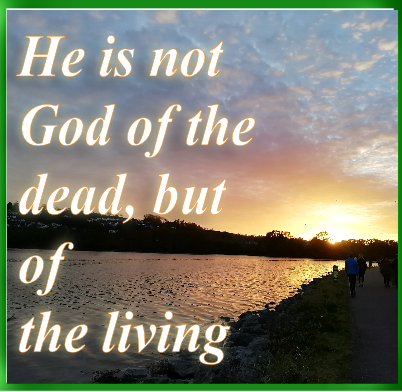6 November 2022
Maccabees 7:1-2, 9-14 2 Thessalonians 2: 16-3:5 Luke 20:27-38
Theme: Faith in God’s Promise of Eternal Life
Last Sunday we were reminded of the moral courage of Zacchaeus, the diminutive tax collector, standing his ground in the face of a hostile crowd and welcoming Jesus into his home and into his heart. In today’s first reading from the second book of Maccabees we have another example of courage: the heroic courage of a mother and her seven sons enduring horrific suffering and death rather than abandon their ancestral faith. Their courage is based on trust in the God of Abraham, Isaac and Jacob, who ‘is God, not of the dead, but of the living; for to him all people are in fact alive’ (Lk 20:38).
In the second century before Christ, a Jewish priestly family, the Maccabees, launched a revolt against the rule of the Syrian King, Antiochus IV, who wanted to replace Jewish culture and religion with Greek culture. Among the religious practices he tried to suppress was the Jewish prohibition against eating pork. This is the background of our first reading, which depicts the horrific torture and death of several members of a brave family who resisted the King’s edict. The focus of the reading is not the dietary preferences of the Jews, but the faith of the brothers who are prepared to die rather than break the laws of their ancestors (cf. 2 Macc 7:2). It is about values that transcend physical existence, values that are more important than physical survival. It is about a choice based on God’s promise of eternal life, as the words of these martyrs illustrate: ‘The King of the world will raise us up, since it is for his laws that we die, to live again forever… Ours is the better choice, to meet death at human hands, yet relying on God’s promise that we shall be raised up by him’ (2 Macc 7: 9, 14).
In today’s gospel reading, Jesus affirms the faith of the Maccabean martyrs when he is confronted by the Sadducees, a sect of Judaism who did not believe in the resurrection. The conundrum the Sadducees present to Jesus is about a woman who was married to 7 brothers. It is intended to make Jesus look foolish. But Jesus turns the tables on them, and it is they that end up looking foolish for imagining that life beyond the grave is a straightforward continuation of life on this earth. Jesus points out that, ‘while the children of this world take wives and husbands,… the children of the resurrection do not marry, because they can no longer die (Lk 20: 34-35). In other words, the lives of those who have gone ahead of us, ‘marked with the sign of faith’ (Eucharistic Prayer, IV), are ‘changed not ended’ (First Preface for the Dead). They are completely transformed, in a manner, and to a degree, we cannot imagine. In the words of St John, ‘we are already the children of God, but what we are to be in the future has not yet been revealed; all we know is the when it is revealed we shall be like God because we shall see God as he really is’ (1 John 3:2).
Our hope of resurrection is based on the power and love that God has shown us by raising Jesus from the dead. St Paul reminds us in our second reading today that God our Father ‘has given us his love and, through his grace, such inexhaustible comfort and such sure hope’ (2 Thess 2: 16). Today’s readings challenge us to renew our faith in the Lord of our lives, the one who is ‘God, not of the dead, but of the living’, and in the blessed destiny he has in store for us. This is the faith that gives ultimate meaning to our lives. And it is the faith we express in a special way in the month of November when we remember all our deceased loved ones and pray for then.
Often when we remember our dead, we tend to think of them as ‘departed souls’, completely absent from us. This, according to the great German theologian, Karl Rahner, is a serious mistake, for if the dead are alive in God, they must, in some way, be present to us as God is present. I will end with Rahner’s profound and comforting reflection.
[The Dead] do not leave us. They remain! Where are they? In darkness? Oh, no! It is we who are in darkness. We do not see them, but they see us. Their eyes, radiant with glory, are fixed upon our eyes full of tears…. Though invisible to us, our dead are not absent.
I have often reflected upon the surest comfort for those who mourn. It is this: a firm faith in the real and continual presence of our loved ones; it is the clear and penetrating conviction that death has not destroyed them, nor carried them away. They are not even absent, but living near to us, transfigured: having lost, in their glorious change, no delicacy of their soul, no tenderness of their hearts, nor especial preference in their affection. On the contrary, they have, in depth and fervour of devotion, grown larger a hundredfold. Death is, for the good, a translation into light, into power, into love. Those who on earth were only ordinary Christians become perfect, those who were good become sublime.
So let us pray that the God of love ‘may enlighten the eyes of our mind so that we can see what hope his call holds for us, what rich glories he has promised the saints will inherit (Eph 1:18).
To listen to an alternative Homily from Fr Tom Casey of the SMA Media Centre, Ndola, Zambia please click on the play button below.
|
|

